[高中英语]人教新课标英语必修四Unit 2 Working the land教案
人教版高中英语必修4《Unit 2 Working the land》教案2篇
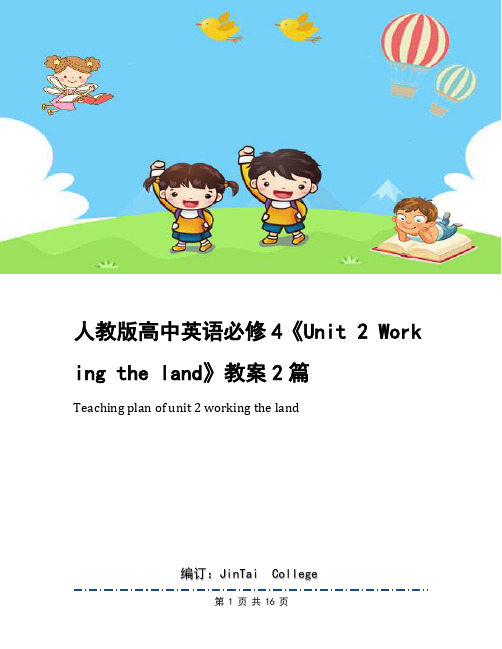
人教版高中英语必修4《Unit 2 Work ing the land》教案2篇Teaching plan of unit 2 working the land编订:JinTai College人教版高中英语必修4《Unit 2 Working the land》教案2篇前言:英语作为在许多国际组织或者会议上都是必需语言,几乎所有学校选择英语作为其主要或唯一的外语必修课。
英语教学涉及多种专业理论知识,包括语言学、第二语言习得、词汇学、句法学、文体学、语料库理论、认知心理学等内容。
本教案根据英语课程标准的要求和教学对象的特点,将教学诸要素有序安排,确定合适的教学方案的设想和计划、并以启迪发展学生智力为根本目的。
便于学习和使用,本文档下载后内容可按需编辑修改及打印。
本文简要目录如下:【下载该文档后使用Word打开,按住键盘Ctrl键且鼠标单击目录内容即可跳转到对应篇章】1、篇章1:人教版高中英语必修4《Unit 2 Working the land》教案2、篇章2:人教版高中英语必修4《Unit 2 Working the land》教案篇章1:人教版高中英语必修4《Unit 2 Working the land》教案教学准备教学目标(1)知识目标:让学生通过阅读课文更多地了解我国著名的农业科学家袁隆平的科研成果及其影响。
(2)能力目标:让学生进一步使用恰当地阅读方式与技能,如略读(skimming),快速阅读(fast reading),细读(close reading)等(3)情感目标:让学生不但学习袁隆平的科研精神,更要学习他不计较名利,踏踏实实的生活态度。
教学重难点1.阅读课文更多地了解我国著名的农业科学家袁隆平的科研成果及其影响。
教学过程1.话题的引导。
(Pre-reading)1).开头通过设计了一首熟悉的诗歌,让学生知道话题---farming.2).涉及到提高产量从而解决世界饥荒问题,从而引出本节课的中心话题--伟大人物袁隆平。
人教新课标高中英语必修四Unit Working the land reading说课 课件
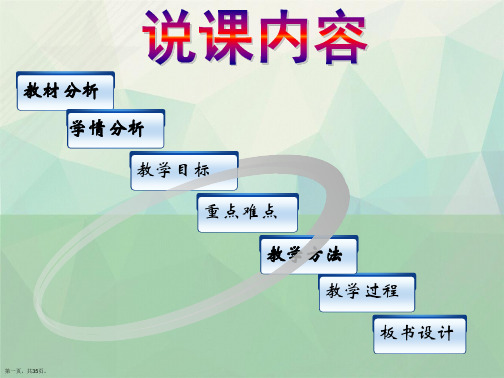
Hunger
Six million children under the age of five die every year as a result of hunger. One child dies every five seconds.
Seeing this, what can we do?
Do you know the Chinese poem?
第八页,共35页。
第九页,共35页。
fertilizing
ploughing
irrigating
seeding
winnowing
第十页,共35页。
transplanting
havesting
Ploughing 犁田
Seeding播 种
Fertilizig 施肥
第十二页,共35页。
If there was no rice one day, what would happen?
第十三页,共35页。
If that happened, people might die of hunger. The whole world would get into trouble.
a. He was born into a poor farmer’s family in 1930 .
b. He graduated from Southwest Agricultural college. c. In 1950, Chinese farmers produced 50 million
Which of the following description about Dr Yuan’s personality is not true? A. He is satisfied with his life because he is
人教新课标英语必修4全册教案(Unit 2 Working the land)
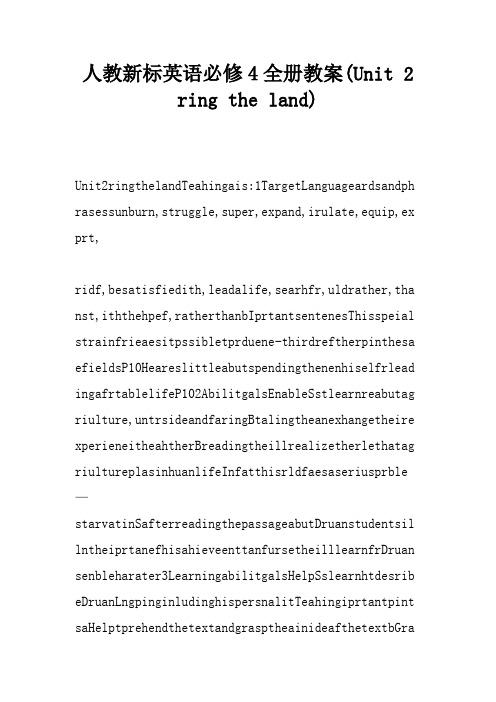
人教新标英语必修4全册教案(Unit 2ring the land)Unit2ringthelandTeahingais:1TargetLanguageardsandph rasessunburn,struggle,super,expand,irulate,equip,ex prt,ridf,besatisfiedith,leadalife,searhfr,uldrather,tha nst,iththehpef,ratherthanbIprtantsentenesThisspeial strainfrieaesitpssibletprduene-thirdreftherpinthesa efieldsP10Heareslittleabutspendingthenenhiselfrlead ingafrtablelifeP102AbilitgalsEnableSstlearnreabutag riulture,untrsideandfaringBtalingtheanexhangetheire xperieneitheahtherBreadingtheillrealizetherlethatag riultureplasinhuanlifeInfatthisrldfaesaseriusprble—starvatinSafterreadingthepassageabutDruanstudentsil lntheiprtanefhisahieveenttanfursetheilllearnfrDruan senbleharater3LearningabilitgalsHelpSslearnhtdesrib eDruanLngpinginludinghispersnalitTeahingiprtantpint saHelptprehendthetextandgrasptheainideafthetextbGrasptheusagefserdsandexpressinsHthelpstudentsaeupthei rindstaentributinsttherlandinthefuturelieDruanTeahi ngdiffiultpintsaHthelpstudentslearnreabutagriulture bHelpstudentsreallastertheusagefrdsandexpressinsTea hingethdsTaling,questining-and-anseringativitandrea dingTeahingaidsAtapererder,apretrandaputerTeahingpr edures≈≈asThefirstperidReadingStep1GreetingandRevisin1Greetthestudentsasnral2RevisethearingupiththefllingquestinHduthintgrurainfd--rie?-----1)First,thefarersplthefieldThehavetaeth esillseenughtplantrps2)Send,grseungplants3)Third,th einserttheungplantsintthelsefield4)Atlast,theillget theharvestStep2Pre-reading1Asthefllingquestins1)hat’stheainfdinanadaandUSA:-----ptatesandbread2)hatisth eainfdinSuthAeria:-----rn/aize3)hatistheainfdinSuth eastAsianuntries:-----rie2Shthestudentssepituresandasthequestinhatis happeningtthesepepleinEastAsianandSutheastAsianuntr ies?Thenshrenesliethat:InternatinalFatsnHungerandPvert1)Ever8sends,ahildsehereintherlddiesfrstarvatin2 )rethan800illinpepleintherldsufferfralnutritin---79 9illinfthearefrthedevelpingrldrethan13illinftheareu ndertheagefAtlastasthestudentstdisuss:Ifuhadthehane tdsethingthelpendhungerintherld,hatuldud?Enuragethe studentsttelltheirpinins,Thengiveanlusin:Thenlatslv ethefdshrtageprbleistinreasetheutputfthegrainrpperl andareathrughtheadvaneentfsieneandtehnlg3leadthestudentstpaattentintthepeple---uanLngpingAs: hatdunabuthi?--------FatherfHbridRieThenleadtthetpi fthereadingpassageAPineerFrAllPepleStep3ListeningLi stentthetape,trtfindutseinfratinftheherNae_________ ___Age____________b_____________Eduatin_________Ahieveent_______Hbbies __________Step4FastreadingReadthepassagequilandanse rthetrue-r-falsequestins•Druanisreafarerthanasientist•2Druan’sindfrieisthestsuitablefrhina’sfarland•3Druanuldratherrthanrelax•4Druanhasdreashenheisasleepandalshenheisaae•DruanensasiplelifethanstrihandfauspepleSteparefulre adingReadeahparagraphandanserthefllingquestins:Para 1:1hatdseDruanllie?h?2hatishisahieveent?Para2:hdidD ruananttinreasetherieutputhenheasung?2Hdeshehelprid therldfhunger?Para341hatindflifeisDruanleading?2hat isDruan’sdrea?Step6Siing:finduttheainideafeahparagraphParag raphainIdea1Hisappearaneandahieveents2Hisbirth,eduatinandresearh3H ispersnalit4HisdreaStep7Her1LearnthepeThePeasants’LtLiShenFarerseedingatnn,Seatdnthefieldsnhnsfdnatra,D uettheirtilingda?2FinishtheexerisesinLearningabutLa nguage3Retellthetextinabut10rdsNtes:aUsethefirstpersntretellthestrbTrtusetheprpernuntin sThesendperidLearningabutLanguageAisThelpstudentsle arnabutThe–ingfrastheSubet≈betThelpstudentsdisverandlearntu seseusefulrdsandexpressinsThelpstudentsdisverandlea rntuseseusefulstruturesPreduresIaringuparingupreadi ngaludthetextAPINEERFRALLPEPLELanguageislearnedinnt extSlet’sfirstreviethetextlearnedesterdabreadingitaludTrtfr euturEnglishsllandlearlIIDisveringusefulrdsandexpre ssinsInpairsdtheexerises1,2and3npages11and12uustfin ishtheininutesIIILearningabutgraar1ReadandidentifReadthetextabutuanLngpingagain,painga ttentintthesenteneshihusethe–ingfrasthesubetandbetInthesentene“ishingfrthings,hever,stnthing“the–ingisusedassubetItanbealsusedasbetfthesenteneFrexap le:uanLngpingliesplainghisvilin2nslidatingbdexerisesTnslidateurunderstandinguillbeg iven10inutestgverexerises1,2,3,4andnpages12and13uaustritenurtextbIeanthestudent’sbuareringbIIIReadusedaterialsfrThe–ingfrastheSubet≈bet)语法学习——动名词1动名词作主语1)名词直接放在句首作主语。
人教版高中英语必修四Unit2Workingtheland(含详细答案)
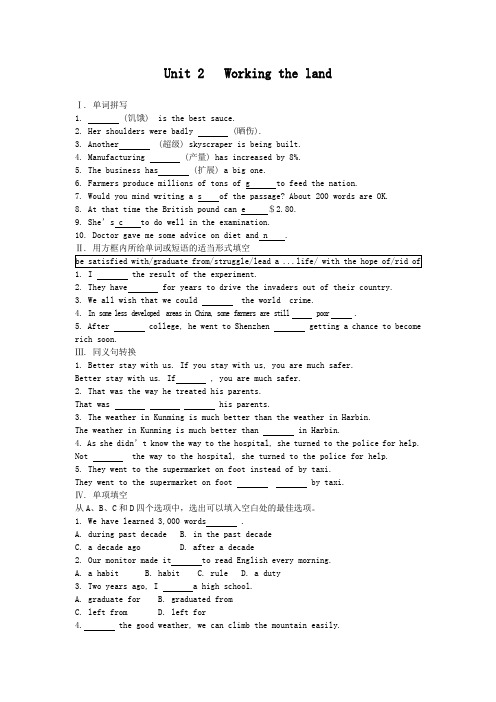
Unit 2 Working the landⅠ. 单词拼写1. (饥饿) is the best sauce.2. Her shoulders were badly (晒伤).3. Another (超级) skyscraper is being built.4. Manufacturing (产量) has increased by 8%.5. The business has (扩展) a big one.6. Farmers produce millions of tons of g to feed the nation.7. Would you mind writing a s of the passage? About 200 words are OK.8. At that time the British pound can e $2.80.9. She’s c to do well in the examination.10. Doctor gave me some advice on diet and n .Ⅱ. 用方框内所给单词或短语的适当形式填空1. I the result of the experiment.2. They have for years to drive the invaders out of their country.3. We all wish that we could the world crime.4. In some less developed areas in China, some farmers are still poor .5. After college, he went to Shenzhen getting a chance to become rich soon.Ⅲ. 同义句转换1. Better stay with us. If you stay with us, you are much safer.Better stay with us. If , you are much safer.2. That was the way he treated his parents.That was his parents.3. The weather in Kunming is much better than the weather in Harbin.The weather in Kunming is much better than in Harbin.4. As she didn’t know the way to the hospital, she turned to the police for help. Not the way to the hospital, she turned to the police for help.5. They went to the supermarket on foot instead of by taxi.They went to the supermarket on foot by taxi.Ⅳ. 单项填空从A、B、C和D四个选项中,选出可以填入空白处的最佳选项。
人教新课标高中英语必修四Unit 2 Working the land课件
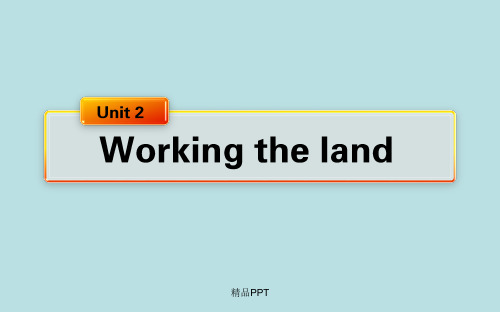
精品PPT
4.(2010·江苏高考,34)George is going to talk about the geography of his country, but I'd rather he ________ more on its culture.
A.focus B.focused C.would focus D.had focused [解析] 句意:乔治打算谈论他的国家的地理,但是我宁愿 他把话题多集中于文化上。本题考查虚拟语气。would rather 后 加从句,如果表示过去的动作应用过去完成时态,如果表示现在 或将来的动作则用过去时态。根据句意可知答案为 B 项。
[答案] B
精品PPT
题组 2 v-ing 形式作主语和宾语 1.(2011·四川,2)Lydia doesn't feel like ________ abroad. Her parents are old. A.study B.studying C.studied D.to study
[解析] 句意:Lydia 不想出国读书,因为她的父母都老了。 考查非谓语动词。这里用固定搭配 feel like doing sth.表示“想要 做某事”,只有 B 项符合搭配。
精品PPT
探究归纳 (1)confuse sb.使某人困惑 (2)confuse...with/and...混淆;把……混同 (3)get confused 感到困惑 (4)be confused in mind 心烦意乱
精品PPT
[拓展] ①confusion n.混乱;紊乱;混乱状态 ②confused 和 confusing 的区别:两者都是形容词:confused 指“困惑的;迷惑不解的;被弄糊涂的”,表示人的内心感受; confusing 指“使人困惑的;令人迷惑的;使人混乱的”,表示事 物的状态。
[高一英语]必修4unit2working-the-land单词讲解
![[高一英语]必修4unit2working-the-land单词讲解](https://img.taocdn.com/s3/m/5b0b9d1889eb172dec63b704.png)
语境助记——词不离句,句不离段
People struggled
against
hunger for several decades,but to
their regret , they still couldn’t
increase the output of grain
production.Therefore hunger was
令人遗憾的是……
共 96 页
21
❖ ①It’s no use regretting what you have done. ❖ 后悔你做过的事情没有用。 ❖ ②I regret that I am unable to accept your kind invitation. ❖ 很遗憾,我不能接受你的友好邀请。 ❖ ③I have always regretted not having studied harder at
with great/deep regret很遗ret让某人感到遗憾的是
regret v.&n. 遗憾;后悔;惋惜
refuse with much regret (many regrets) 婉言拒绝
to one's regret 令人遗憾的是
feel regretful for....对……感到后悔
2 She struggled to her feet and continued walking. 她挣扎着站起来,继续走。
Dina,________for months to find a job as a waitress,finally took a position at a local
5.circulate vt. & vi.循环;流传 →circulation n.循环流通 6.battle n.战役;战斗;较量;斗争vt. & vi.搏斗;奋斗 7.therefore adv.因此;所以;因而
人教版高中英语必修四unit2词汇讲解及练习
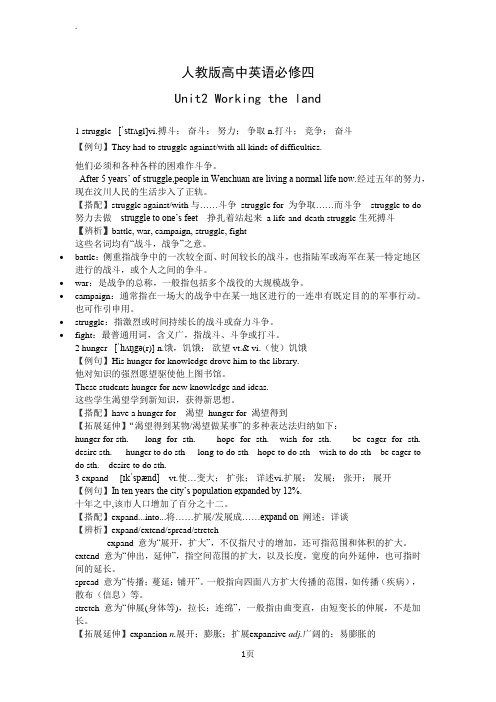
人教版高中英语必修四Unit2 Working the land1 struggle [ˈstrʌgl]vi.搏斗;奋斗;努力;争取n.打斗;竞争;奋斗【例句】They had to struggle against/with all kinds of difficulties.他们必须和各种各样的困难作斗争。
After 5 years’ of struggle,people in Wenchuan are living a normal life now.经过五年的努力,现在汶川人民的生活步入了正轨。
【搭配】struggle against/with与……斗争struggle for 为争取……而斗争struggle to do 努力去做struggle to one’s feet 挣扎着站起来 a life-and-death struggle生死搏斗【辨析】battle, war, campaign, struggle, fight这些名词均有“战斗,战争”之意。
•battle:侧重指战争中的一次较全面、时间较长的战斗,也指陆军或海军在某一特定地区进行的战斗,或个人之间的争斗。
•war:是战争的总称,一般指包括多个战役的大规模战争。
•campaign:通常指在一场大的战争中在某一地区进行的一连串有既定目的的军事行动。
也可作引申用。
•struggle:指激烈或时间持续长的战斗或奋力斗争。
•fight:最普通用词,含义广,指战斗、斗争或打斗。
2 hunger [ˈhʌŋgə(r)] n.饿,饥饿;欲望vt.& vi.(使)饥饿【例句】His hunger for knowledge drove him to the library.他对知识的强烈愿望驱使他上图书馆。
These students hunger for new knowledge and ideas.这些学生渴望学到新知识,获得新思想。
人教新课标高中英语必修四Unit2Workingtheland教案
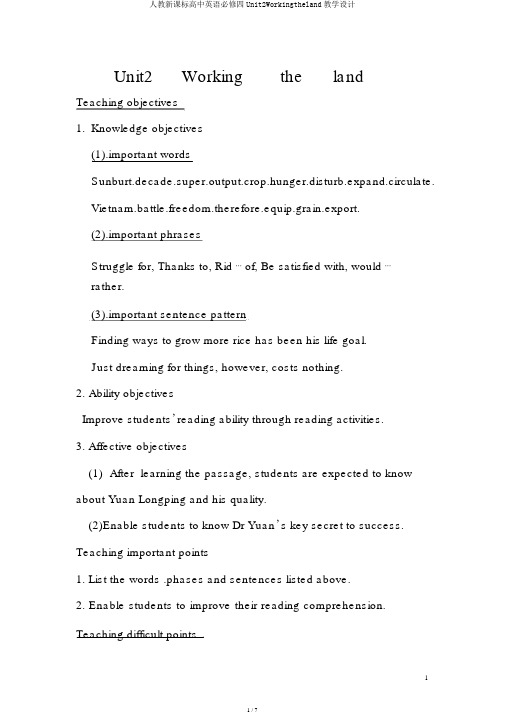
Unit2Working the landTeaching objectives1.Knowledge objectives(1).important wordsSunburt.decade.super.output.crop.hunger.disturb.expand.circulate.Vietnam.battle.freedom.therefore.equip.grain.export.(2).important phrasesStruggle for, Thanks to, Rid ⋯ of, Be satisfied with, would ⋯rather.(3).important sentence patternFinding ways to grow more rice has been his life goal.Just dreaming for things, however, costs nothing.2. Ability objectivesImprove students’reading ability through reading activities.3.Affective objectives(1)After learning the passage, students are expected to know about Yuan Longping and his quality.(2)Enable students to know Dr Yuan’s key secret to success. Teaching important points1.List the words .phases and sentences listed above.2.Enable students to improve their reading comprehension. Teaching difficult points1. Understand the following sentence correctly.Finding ways to grow more rice has been his life goal.Just dreaming for things, however, costs nothing.2.How to help students understand the passage better.Teaching proceduresStep1 Leading in (3 minutes)教师活动:表现一幅农民在田里劳作和一幅田地的图片让学生们观察。
人教课标版高一英语必修4Unit 2 Working the land Reading 精品课件
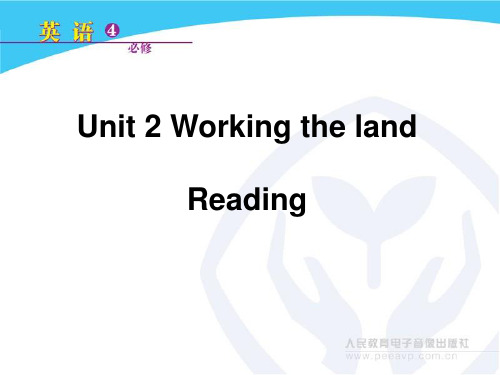
Pre-reading
More than 800 million people go to bed hungry every day. - the World Health Organization (WHO) One billion people in the world suffer from hunger and malnutrition. About 24,000 people die every day from hunger or hunger-related causes. Threefourths of the deaths are children under the age of five. -
III. Reading
Title: A Pioneer for All People
What kind of person is Yuan Longping?
simple, kind, committed, downto-earth, careful, risk-taking, not afraid of failures, creative, serious, hard-working
To use the land to make money through farming or mining.
Warming Up
3. What words to do with agriculture can you think of ?
plant, grow, produce, feed, harvest, farming, animal waste, tools …
agriculture
field, farm, rice, wheat, crops, fruit and vegetables, corn, peanuts …
Unit2Workingtheland教案(新人教必修4).doc
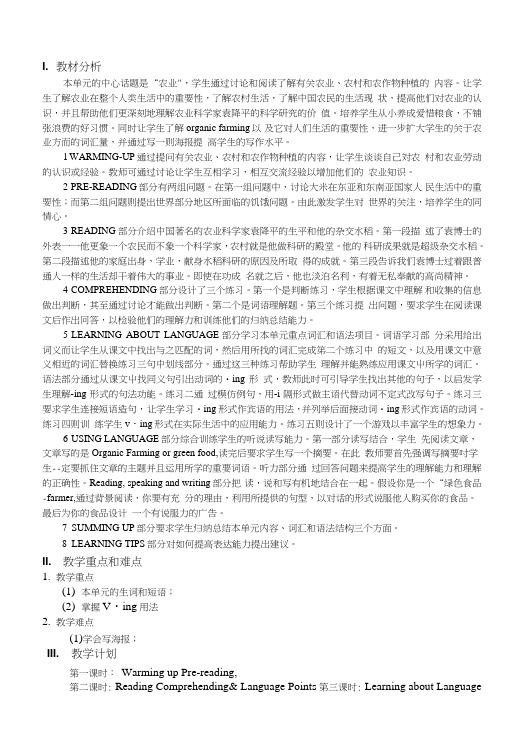
I. 教材分析本单元的中心话题是“农业",学生通过讨论和阅读了解有关农业、农村和农作物种植的内容。
让学生了解农业在整个人类生活中的重要性,了解农村生活,了解中国农民的生活现状,提高他们对农业的认识,并且帮助他们更深刻地理解农业科学家袁降平的科学研究的价值。
培养学生从小养成爱惜粮食,不铺张浪费的好习惯。
同时让学生了解organic farming以及它对人们生活的重要性,进一步扩大学生的关于农业方而的词汇量,并通过写一则海报提高学生的写作水平。
1WARMING-UP通过提问有关农业、农村和农作物种植的内容,让学生谈谈自己対农村和农业劳动的认识或经验。
教师可通过讨论让学生互相学习,相互交流经验以增加他们的农业知识。
2PRE-READING部分有两组问题。
在第一组问题中,讨论大米在东亚和东南亚国家人民生活中的重要性;而第二组问题则提出世界部分地区所面临的饥饿问题。
由此激发学生对世界的关注,培养学生的同情心。
3READING部分介绍中国著名的农业科学家袁降平的生平和他的杂交水稻。
第一段描述了袁博士的外表一一他更象一个农民而不象一个科学家,农村就是他做科研的殿堂。
他的科研成果就是超级杂交水稻。
第二段描述他的家庭出身,学业,献身水稻科研的原因及所取得的成就。
第三段告诉我们袁博士过着跟普通人一样的生活却干着伟大的事业。
即使在功成名就之后,他也淡泊名利,有着无私奉献的高尚精神。
4COMPREHENDING部分设计了三个练习。
第一个是判断练习,学生根据课文中理解和收集的信息做出判断,其至通过讨论才能做出判断。
第二个是词语理解题。
第三个练习提出问题,要求学生在阅读课文后作出冋答,以检验他们的理解力和训练他们的归纳总结能力。
5LEARNING ABOUT LANGUAGE部分学习本单元重点词汇和语法项目。
词语学习部分采用给出词义而让学生从课文中找出与之匹配的词,然后用所找的词汇完成笫二个练习中的短文,以及用课文中意义相近的词汇替换练习三句中划线部分。
人教新课标必修四 Unit 2 Working the land非谓语动词

注意
•不定式一般不能作介词的宾语,只有在极少数介词如 : •but, except等后才行,此时不定式可带 to 或不带 to。 to look
1.He seldom comes except ___at my pictures.(look) to wait 2.We have no choice but _____outside.(wait) ask 3.They could do nothing but ___for help.(ask)
二、功能及用法(作主语)
③在there be结构中作主语,这种结构的意思相当 于“It is impossible to do… ” 如 There is no doing……:
1)这种事开不得玩笑。 no joking Here is ____________ about such matter. 2)无法知道他什么时候离开。 no knowing when he would leave. There was _________
1.The teacher made the boy__( go )out of the classroom finish 2.We observed them____(finish)the work to tell let sb do sth 3.He was made___(tell) a story have get sb to do sth 4.Let us__( have) a rest. to hand 5.The teacher got the students ____(hand )in homework.
相当于形容词、副词。作表语、定语、宾语补 足语、状语。
一 动词不定式 The Infinitive
人教新课标必修4 Unit2 Working the land[全套课件]
![人教新课标必修4 Unit2 Working the land[全套课件]](https://img.taocdn.com/s3/m/ffc9fe2e915f804d2b16c117.png)
The measures taken to deal with hunger
Invent a new kind of plant to produce more food.
Find a sort of fertilizer(肥料)to give rice enough nutrition. Stop the pollution to the environment and protect the soil in the field.
He has a sunburnt face and arms and a slim, strong body. He is more like a farmer than a scientist.
2.What’s his achievement?
He grows what is called super hybrid rice, which makes it possible to produce one-third more of the crop in the same fields. Using his hybrid rice farmers’ producing harvests twice as large as before.
Rice. It is said that there are 2.4 billion people to eat rice every day throughout the world.
What do you think would happen if tomorrow there was suddenly no rice to eat?
Are you from a farmer’s family? what do you know about farming?
- 1、下载文档前请自行甄别文档内容的完整性,平台不提供额外的编辑、内容补充、找答案等附加服务。
- 2、"仅部分预览"的文档,不可在线预览部分如存在完整性等问题,可反馈申请退款(可完整预览的文档不适用该条件!)。
- 3、如文档侵犯您的权益,请联系客服反馈,我们会尽快为您处理(人工客服工作时间:9:00-18:30)。
Unit2 Working the landVocabulary and Useful ExpressionsStep1.重点难点1. In many ways, he is one of them, and he struggled for the past five decades to help them.In a way; in one way; in some ways 在某种程度上2.However, he cares little about spending the money on himself or leading a comfortable life.care v. 在乎,在意,喜欢,有兴趣spend sth. … on … 在某方面花费spend … (in) doing sth. 花费…做某事3.Wishing for nothing, however, costs nothing.wishing for nothing 动名词短语做主语,谓语动词用单数.however是插入语,表示语气的一种转折.4.It also refers to crops growing with natural rather than chemical fertilizers.refer to 与…有关,关系到某人、某事;提到,涉及;参考5.Instead, organic farmers insist on changing crops every two or three years.insist on 坚持要求;insist后面可以跟从句,其中谓语动词常用should + 动词原形构成6.Dr. Yuan awoke from his dream with the hope of producing a kind of rice that could fees more people.with the hope of 带着某种希望7.He used to walk to his fields twice a day, but now he prefers to ride his motorcycle.used to 过去常常(现在已经不是如此)be used to doing 意思是“习惯于”prefer to do (rather than do) 相比之下更喜欢做某事8.But whatever they grow they make sure that what is left in the ground after harvesting becomes a natural fertilizer for the next year’s crop.whatever引导让步状语从句,表示“无论怎样”,相当于no matter what.Eg: Whatever you do, don’t give up.Step 2.功能句型建议(Suggestion & advice)I would rather … I don’t like … because …I’d prefer … because … It’s a great pity that …Should we/I …? It’s better to …If I h ave a choice I’d choose … because … You need to …May I suggest …? Let me suggest … because …Perhaps we should suggest … because … But what/how about …?Step 3. 重点单词及短语单词①hunger n. 饥饿,食欲;v. 渴望得到某事物,某人hunger for/after sth./sb.②struggle vi.stuggle with sb. 与某人争斗,搏斗struggle (against/with sb./sth.)struggle against/with sb./sth. (for sth.) 争斗,拼搏,奋斗,努力③expand vi. (使某事物)变大,增强,伸展,张开expand on sth. 阐述或详述expansion n. 扩大,扩展,膨胀④equip vt.equip sb./sth. (with sth.) 配备,装备equipment n. 设备,装备⑤export vt. 输出;n. 出口业,出口品import vt. 进口⑥circulate vi. vt. 使某物循环,流通,传播;vt. 发侧知告知某人circulation n. 循环,流传,传播⑦confuse vt. 把某人弄糊涂,使为难,打乱confusion n. 混乱,混淆⑧reduce vt. 缩减,减小,降低reduction n. 减少,缩小⑨supply vt. 供给,供应,满足;n. 供应,供给之物⑩exchange vt. 交换,交易;n. 交换,更换,互访,交流exhange sth. with sth.exchangeable adj. 可交换的,可退换的,可兑换的短语rid … of 清除,摆脱be satisfied with = be contented 感到满足,满意的would rather do sth. 宁可做某事refer to 与…有关,关系到某人,某事,提到,参考search for 寻找,搜寻thanks to 多亏,由于rather than 而不,宁愿…而不Unit2 Working the landWarming Up, Pre-reading and Reading Period 1 Warming up and pre-reading.Step 1 Lead-in.Poem By Li ShenFarmers weeding at noon,Sweat down the field soon.Who knows food on a tray,Due to their toiling day.Then let one student recite the poem in Chinese.Step 2 Warming up by questioningHello, everyone. We shall read about man who works the land today. Have you ever grown any plants? If not, what kind of plant would you like to grow? How will you grow it?(For reference: Mr. Li, I worked with my father in the rice field last year. We grow hybrid rice and use animal wastes to make the soil rich.)Has anyone of you ever been to the countryside? What did you do there?(For reference: I went to Chuankou the day before yesterday. It is a small mountain village 75 li north of Beijing. I went there to visit my uncle’s family. I like that small beautiful village ve ry much. )Who are from a farmer’s family? What do you know about farming?Step 3 Pre-reading and talkingQuestioning and answeringRice is main food in South China. What do you think would happen if tomorrow there was suddenly no rice to eat?(For reference: Then the south people would have to change their eating habit. They could turn to potatoes, wheat flour, cow and sheep cheese, cabbage, onions and garlic for food. They are the bases of the traditional food in North China. )If you had the chance to do one thing to help end hunger in the world, what would you do?(For reference: I would try to end hunger by popularizing the advanced farming techniques.Modern techniques could be introduced to increase the rice output, and expand the area of fields.)Giving background information about Professor Yuan LongpingHave you ever heard of a man called Professor Yuan Longping? Would anyone of you tell the class something about him?(For reference: Professor Y uan Longping is a Chinese agricultural scientist. Professor Yuan's breakthrough scientific achievement led to the world's first successful and widely grown hybrid rice varieties, revolutionizing rice cultivation in China and tripling production over a generation. His approach to rice breeding then spread internationally throughout Asia and to Africa and the Americas, providing food for tens of millions and leading to his becoming known as the "Father of Hybrid Rice."Step 4. ReadingReading aloud to the recordingComprehension—understanding what you are reading—is important. To read in thought groups is an easy, yet effective, way of improving reading comprehension. Now turn to page 9 and read aloud to the recording of the text A PIONEER FOR ALL PEOPLE. Pay attention to the thought groups in the sentences while listening and reading aloud.A brief introduction:Yuan Longping is known as China’s “father of hybrid rice”. It’s said that in China, we eat depending on “Two Ping” ---- Deng Xiaoping, who made the policy of System of Production Responsibility, & Yuan Longping, who invented hybrid rice.Yuan Longping, who was born in September, 1930, graduated from Agriculture Department in Southwest Agricultural Institute. He has been working on agriculture education & the research into hybrid rice since he left the institute.In the 1960s, when China was suffering from serious famine, he came up with the idea of hybrid rice, which has a high yield ( or output). Ten years later, he succeeded in inventing a new species that produced a 20 percent higher yield than common types of rice.Yuan devoted himself to the research into agriculture, & was honored by UNESCO & FAO(联合国教科文组织). Although he is 74 years old, he is still working on the research into agriculture.Period 2 ReadingStep 1 Lead-in.. Listen to the tape carefully then answer these questions.1)When and who did become the first agricultural pioneer in the world to grow rice that has a high output?2)What did Yuan Longping invent?Step2. Read the passage once again,then find out these sentences true or false.1)Dr Yuan is more a farmer than a scientist.2 )Dr Yuan’s kind of rice is the most suitable for China’s farmland.3)Dr Yuan would rather work than relax.4 )Dr Yuan has dreams when he is asleep and also when he is awake.5 )Dr Yuan enjoys a simpler life than most rich and famous people.Step3. Find out the topic sentences of each paragraphPara. 1: He became the first agricultural pioneer in the world to grow rice that has a high output.Para.2:He has devoted his life to finding ways to grow more and more rice..Para.3:He cares little about spending the money on himself and would rather keep time for his hobbies.Para.4 Dr. Yuan’s dreams.Step4. Write down Yuan Longping’s personal informationIn pairs, read the text, find information to complete the following form.Step 5 Language points:1. Struggle for…为争取……而斗争Struggle against…为反对……而斗争Struggle with… 与……争斗1)The swimmer struggled against the tide.2)We had to struggle with/against all kinds of difficulties.3)The slaves struggled for the freedom2. 使做…成为… make +it +adj./n. +to do好天气使游泳成为可能The fine weather makes it possible( for us )to swim.他将每早跑步做为一个规则He makes it a rule to run every morning.其他可用这种结构的词:feel, find, think, consider…3.搜查,搜索search (sb. / sth.) for …He searched all the rooms for the missing person.They searched the man all over for money.4.由于,多亏thanks to 相当于because of5.是从前两倍那么多twice as large as before相当于once larger than before6.对……感到满意be satisfied with…相当于be pleased withadj. satisfactory/satisfyingn. satisfaction7.在乎,在意care about比较care forMy aunt cared for me when my parents were away last week.Dr Yuan never cares about money and fame.8. Indeed, his sunburn face and arms and his slim, strong body are like those of millions of other Chinese farmers.e.g: The streets in Beijing are wider than those in my hometown.The number of students in our school is larger than that in their school.9. Dr Yuan grows what is called super hybrid rice.e.g: He came to what is called America.10. This special strain of rice makes it possible to produce one -third more of the crop in the same fields.e.g: That made it possible for life to begin to develop.The development of science makes it possible for us to know more about the universe.11. Dr Yuan awoke from his dream with the hope of producing a kind of rice (that could feed more people).e.g: He went to the U.S with the hope of finding a better job there.Step 6Closing down by having a dictationTo end the peri od you will take a dictation. It is about Yuan Longping, “Father of Super hybrid rice”.Yuan Longping, China's Most Famous "Farmer"Yuan came up with the idea of hybridizing rice for the first time in the world in 1960s. Since then, 50 percent of China's total rice cultivation fields have grown such rice, which added some 300 billion kilograms to the country's grain output. Furrows grown on his sunburnt face, a slim figure and coiled-up trousers legs would confuse foreign reporters who came to interview themost famous scientist in China, who would rather be called “a farmer”. Indeed, like many Chinese farmers, Yuan in his 70s and has devoted most of his life growing rice in paddy fields, but unlike those farmers, he reaps the seed from experimental fields only for hybridizing rice.Unit2 Working the landListening, Speaking and WritingLearning AimsTo help students read the passage Organic Farming.To help students to use the language by reading, listening, speaking and writing.ProceduresI.Warming up by listening and reading aloudLanguage is created to be listened to and spoken first. So open your book to page 13 and read it aloud while listening to the recording. Watch your pauses between the thought groups.II. Guided reading1.Reading and translatingRead the text sentence by sentence, and put it into Chinese. Who will be the first to try. I will only have four of you to do this task..Reading and underliningNext you are to read and underline all the useful expressions or collocations in the passage. Copy them to your notebook after class as homework.2.Doing exercisesNow you are going to do exercises No. 1, 2 and 3 on page 14 following the article.3.ListeningFor listening turn to page 14 and then 15 for the listening exercises 1, 2 and 3. Are you ready?5. Reading, speaking and writingWhen trying to argue people into or out of doing something we may use the following expressions:In pairs you are to make up a dialogue to argue each other into or out adopting organic farming. I will argue with your monitor, Liang Bochao. Get started.III. Guided writing1.Writing a posterWriting a poster which includes all the information about the uses of computer so that you will encourage more farmers to buy and use. You are asked to base your poster on the overall pattern of the article you learned Organic Farming. Limit your poster to between 200 and 250 words.2.Writing a speechWrite a speech for Professor Yuan Longping. He is to attend an international conference on modern agriculture. You may also make use of the library and network resources for the task. IV. Further applyingFinding informationRead online to find as much information as possible about Professor Y uan Longping and his research group. Share your findings with you partner next time you are here.Writing a reportGo back home to interview your parents or your grandparents about China’s agriculture, its past and present situations. Write a report in English in about 500 words as a weekly project.Acting a text playTurn either one of the two articles into a text play. Rehearse it and play it in front of the class. The play shall last at least 10 minutes.IV. Closing downClosing down by filling a formTo end the period, please fill in the form below.Closing down by imagingImagine and write about what the agriculture will be like 50 years from now in the future. Use your imagination to compete for “wild thinking prize”.Unit2 Working the landGrammar and Useful StructuresLearning AimsTo help students learn about The –ing form as the Subject & Object.To help students discover and learn to use some useful words and expressions.To help students discover and learn to use some useful structures.ProceduresI. Warming upWarming up reading aloud the text A PIONEER FOR ALL PEOPLELanguage is learned in context. So let’s first review the text learne d yesterday by reading it aloud. Try to force out your English slowly and clearly.II. Discovering useful words and expressionsIn pairs do the exercises 1, 2 and 3 . You must finish them in 5 minutes.III. Learning about grammar1. Read and identifyRead the text about Yuan Longping again, paying attention to the sentences which use the –ing form as the subject and object.In the sentence “Wishing for things, however, cost nothing. “the –ing is used as subject.It can be also used as object of the sentence. For example: Yuan Longping likes playing his violin.2. Consolidating by do exercisesTo consolidate your understanding you will be given 10 minutes to go over exercises 1,2,3,4 and 5 on pages 12 and 13. You may just write on your text book. I mean the student’s book you are working by.III. Ready used materials for The –ing form as the Subject & Object)语法学习——动名词1. 动名词作主语1)名词直接放在句首作主语.例如:Using the right hand to shake hands is a convention in many countries.用右手握手是许多国家的一种习俗.2)动名词在“It is no use/ no good/ fun / a waste of time/ a good pleasure 等名词+ doing”结构中作主语,it为形式主语.例如:It is no good writing to him; he never answers letters.写信给他不妥,他从来不回信.It is no use your complaining; the company won’t do anything about it.抱怨是没有用的,公司是不会管的.3)动名词在“I t is useless/ nice/ good/ interesting/ worthwhile 等形容词+ doing”结构中作主语.例如:It is good playing chess after supper.晚饭后弈棋挺好.It is useless speaking.光说是没有用的.4)动名词在“There is(was) no + doing”结构中作主语.例如:There is no denying that she is very efficient.她效率高是不容否认的.There is no telling what he is going to do.他要做什么一点消息都没有.2. 动名词作宾语1)有些动词后面要求跟动名词作宾语.常这样用的动词有:admit 承认;excuse 原谅;postpone 拖延;anticipate 期望;fancy 想象practise 练习;appreciate 欣赏;finish 完成;prevent 防止;avoid 避免;forbid 禁止;propose 建议;consider 考虑;forgive 宽恕;recollect 回忆;delay 耽搁;imagine 想象;resent 厌恶;deny 否认;involve 涉及;resist 抵制;detest 厌恶;keep 保留;risk 冒险;dislike 讨厌;mind 在意;save 挽救;dread 害怕;miss 错过;suggest 建议;enjoy 喜欢;pardon 原谅;understand 理解;escape 逃避;permit 允许例如:I recommend buying the dictionary.我建议买这本词典.I don’t anticipate meeting any opposition.我估计不会遇到任何反对意见.Will you admit having broken the window?你承认不承认打破了窗户?2)有些动词短语后也要求跟动名词作宾语.常这样用的动词短语有:can’t stand 忍不住;can’t help 忍不住;feel like 想,欲;give up 放弃;put off 推迟例如:He put off making a decision till he had more information.在获得详情之前,他没有急于做出决定.Do you feel like taking a walk?你要不要去散步?3)动名词常跟在介词或介词短语后做宾语.常这样用的介词短语有:instead of, look forwardto, object to, keep on, see about, take to 等.例如:We are looking forward to coming to China.我们期待着来中国.We succeeded in getting over all the difficulties.我们终于克服了所有的困难.4)在“have difficulty (trouble, problem, a hard time, fun, a good time) (+in) + 动名词;be busy (in) + 动名词;waste time (in) + 动名词;lost time (in) + 动名词;There is no point (in) + 动名词”等结构中,动名词做介词宾语,in常要省去.例如:The children are busy doing their homework.孩子们忙于做作业.There is no point (in) making the simple experiments once again.再做一次这种简单的实验是毫无意义的.5)在复合宾语中,用it作形式宾语,将动名词短语放在后面.例如:I consider it a waste of time arguing about it.我认为辩论这事是很浪费时间的.6)在“there be”结构当中,be为动名词时,该结构也是一种带逻辑主语的动名词形式.例如:We can imagine there being a lot of fuss about it.我们可以想象到人们对此大惊小怪.Were you disappointed at there not having been more gifts?你对没有更多的礼物感到失望吗?3. 动名词的被动式1)动词need, require, want, deserve后,用动名词的主动形式表示被动意义.其用法相当于不定式的被动结构.例如:The watch needs repairing. (=The watch needs to be repaired.)这块表需要修理.The problem deserves thinking about. (=The problem deservers to be thought about.)这个问题值得考虑.2)在(be)worth后面只能用动名词的主动态来表示被动意义.例如:His suggestion is worth considering. 他的提议值得考虑.IV. Closing down by doing a quiz。
